You're looking for a mindfulness therapy game that can teach your kids, teens, or even adults valuable social skills, self-care practices, and emotional regulation techniques. This game offers 50 cards packed with interactive tools to help you or your loved ones cultivate a stronger, more compassionate mind. By playing this game, you'll reduce stress and anxiety, increase self-awareness, and improve your mood. It's especially beneficial for kids and teens, teaching essential social skills and self-care practices, while also being suitable for adults struggling with mental health conditions. To learn more about this game's effectiveness and reviews, check out the resources below.
Key Takeaways
- Mindfulness therapy games are designed to teach social skills and self-care to kids, teens, and adults through interactive and engaging activities.
- The 50-card game is a valuable tool for promoting emotional intelligence, empathy, and self-awareness in children and adolescents.
- Mindfulness therapy games can help adults develop healthier habits and behaviors, improve relationships, and enhance mental wellbeing.
- The game's focus on social skills and self-care can be particularly beneficial for individuals with anxiety, depression, or trauma.
- Regular mindfulness practice, as taught by the game, can lead to improved emotional regulation, increased self-awareness, and better overall mental health.
What Is Mindfulness Therapy Game
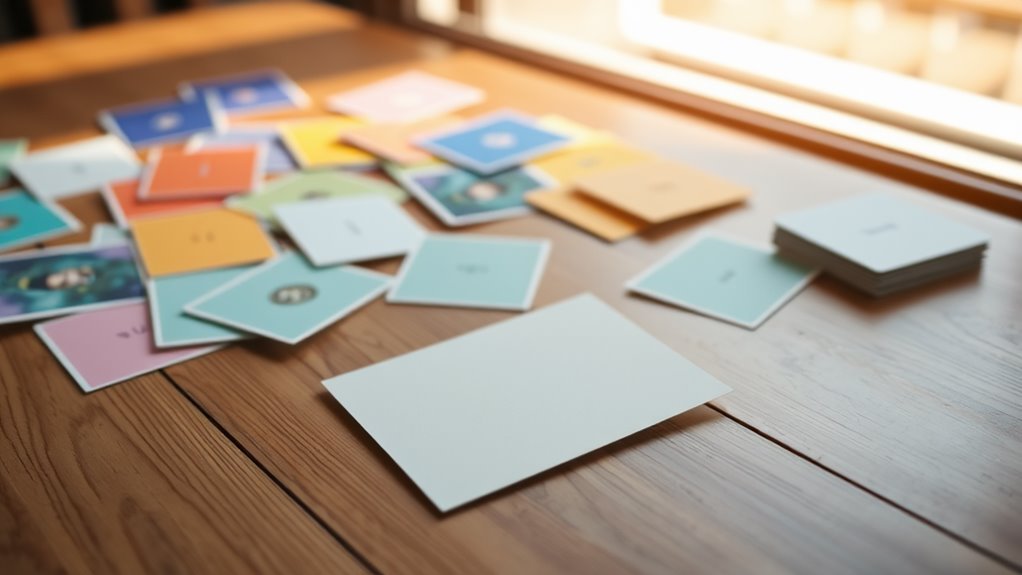
If you're looking to tap into the therapeutic benefits of games, you're in luck – mindfulness therapy games are a rapidly growing field that's changing the way we approach mental wellness. These games are designed to help you become more aware of the present moment, with a focus on cultivating openness and non-judgment about your experiences. By playing mindfulness games, you can gain a deeper understanding of your thoughts, feelings, and actions that might be holding you back. Mindfulness games have been shown to reduce symptoms of anxiety and depression in individuals with mental health conditions. You can incorporate mindfulness into your favorite games, such as Pokémon Go, which can encourage exploration outside the home. Serious games are also designed specifically for therapeutic interventions, such as MBSR and MBCT, which have been proven to be effective in reducing anxiety and stress. Mindfulness games can teach you life skills like focusing, quieting, and reframing, and can even help improve your cognition and body awareness. Whether you're looking to improve your mental wellness or simply have more fun, mindfulness games can be a great way to do so.
Benefits for Kids
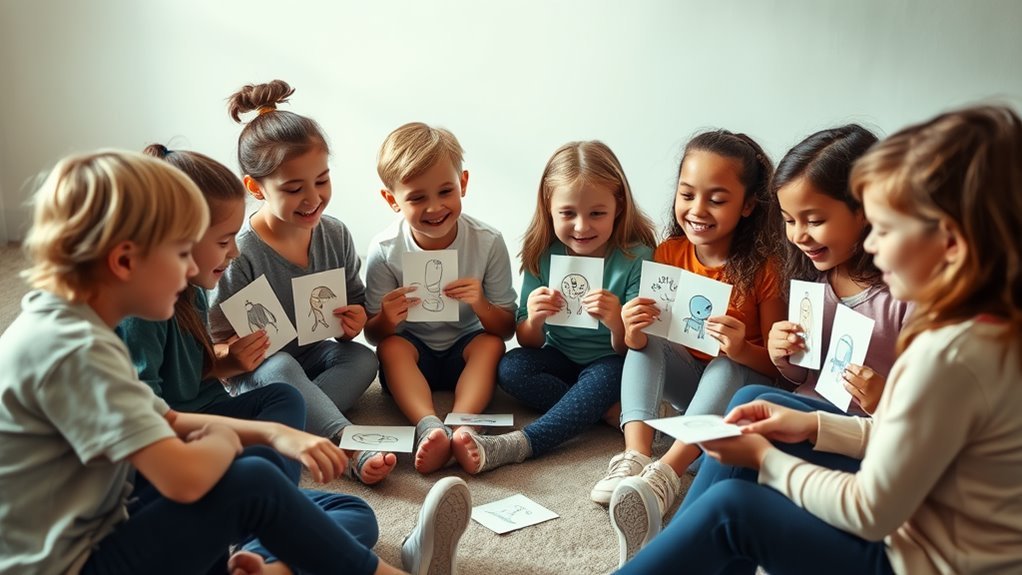
Playing mindfulness games with kids can be a game-changer for their emotional, cognitive, and social development. You're giving your child the tools they need to thrive in life, and it's an investment that will pay off in countless ways. By teaching your child mindfulness, you're helping them develop emotional regulation, which means they'll be better equipped to manage strong emotions and think clearly. They'll learn to recognize when their emotions are clouding their thoughts and know how to clear them through calmness.
As they play, your child's cognitive development will also flourish. They'll improve their focus and attention, think more critically, and make better decisions. They'll even boost their hand-eye coordination and creativity.
But that's not all – mindfulness games also support social skills development, teaching your child empathy, cooperation, and effective communication. They'll learn to work together with others, resolve conflicts, and develop a sense of community and mutual respect.
Advantages for Teens
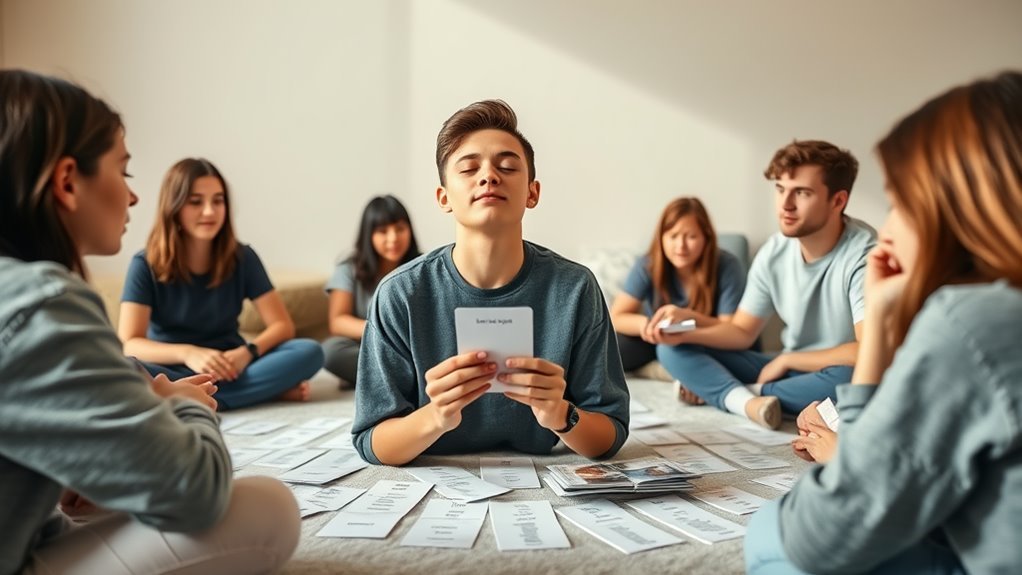
Mindfulness and Its Benefits
- Mindfulness refers to giving full attention to the present moment without judgment.
- The nonjudgmental attitude is key, because we tend to judge our own thoughts, and simply being aware of our thoughts can bring a radical change.
- Mindfulness can be practiced anywhere, at any time, and can be adapted to suit individual needs and preferences.
- Regular mindfulness practice can lead to reduced stress and anxiety, improved emotional regulation, and enhanced overall well-being.
- Benefits in Teens:
- Mindfulness can help teens develop emotional regulation skills, leading to improved relationships and academic performance.
- Regular mindfulness practice can reduce symptoms of anxiety and depression in teens.
- Mindfulness can improve focus and concentration, leading to better academic outcomes.
- Mindfulness can enhance self-awareness, allowing teens to better understand their thoughts, feelings, and behaviors.
- Mindfulness can promote resilience and coping skills, helping teens navigate challenging situations.
Mindfulness Activities for Teens
- Exercise can be a mindfulness activity when approached with a mindful attitude.
- Coloring can be a creative and engaging mindfulness activity.
- Listening to music with full attention can be a calming and enjoyable mindfulness experience.
- Eating a piece of fruit or candy mindfully can be a simple yet effective mindfulness activity.
- Journaling can be a powerful mindfulness tool, allowing teens to process their thoughts and emotions.
Tips for Establishing and Maintaining a Mindfulness Practice
- Start small, with short mindfulness practice sessions, and gradually increase duration and frequency.
- Find a quiet and comfortable space for mindfulness practice.
- Be consistent, making mindfulness a regular part of daily routine.
- Use guided mindfulness exercises or apps to support practice.
- Incorporate mindfulness into daily activities, such as eating or walking.
- Be patient and gentle with yourself, allowing yourself to make mistakes and learn.
- Practice mindfulness regularly, ideally at the same time each day.
- Seek support from friends, family, or a mental health professional if needed.
Scientific Research on Mindfulness
- Mindfulness is most effective when practiced regularly: mindfulness is most effective when practiced regularly, with benefits seen after just a few weeks of practice.
- Mindfulness can reduce symptoms of PTSD: mindfulness has been shown to reduce symptoms of post-traumatic stress disorder (PTSD) in both veterans and civilians.
- Mindfulness can improve sleep: mindfulness has been shown to improve sleep quality and duration in both healthy individuals and those with insomnia.
- Mindfulness can reduce chronic pain: mindfulness has been shown to reduce chronic pain in both healthy individuals and those with chronic pain conditions.
- Mindfulness can improve relationships: mindfulness has been shown to improve relationships with others, including romantic partners and family members.
Benefits of Mindfulness
- Reduces stress and anxiety: mindfulness has been shown to reduce stress and anxiety in both healthy individuals and those with mental health disorders.
- Improves emotional regulation: mindfulness has been shown to improve emotional regulation and reduce symptoms of depression and anxiety.
- Enhances self-awareness: mindfulness has been shown to increase self-awareness and improve relationships with others.
- Improves focus and concentration: mindfulness has been shown to improve focus and concentration in both individuals and students.
- Increases gray matter: mindfulness has been shown to increase gray matter in areas of the brain associated with attention, emotion regulation, and memory.
Mindfulness Therapy Game Teaches Social Skills Self Care More for Kids Teens Adults. 50 Cards
Advantages for Teens
As your teenager navigates the ups and downs of adolescence, mindfulness games can be a powerful tool to help them thrive. Establishing social skills, reducing bullying, and improving communication with this game, you can help your teen develop essential social behaviors that will benefit them in the long run. With this game, your teen will improve their social behaviors, reduce bullying, and enhance communication skills. They'll also foster positive relationships, promote empathy and compassion, and become more aware of others' feelings and perspectives.
As your teen plays this game, they'll also reap self-care benefits. They'll increase their self-awareness, emotion regulation, and self-control, helping them manage impulsivity and develop greater emotional well-being. This will lead to improved academic performance, as they'll focus better and become more concentrated. Your teen will also experience a reduction in stress related to academic pressures, and overall life satisfaction will increase.
Adults and Mental Health
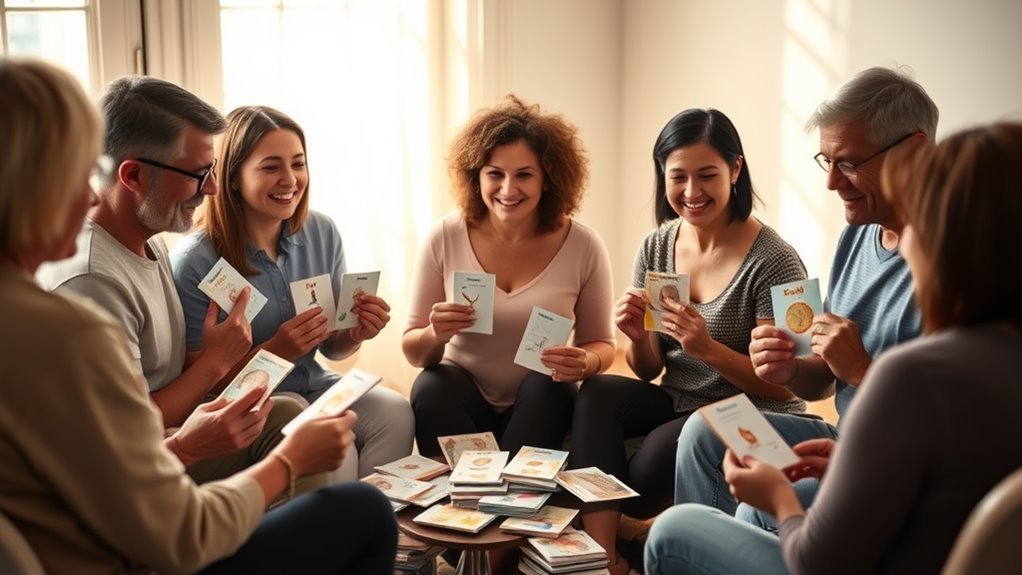
Taking control of your mental health is a journey that can have a profound impact on your overall well-being. By incorporating mindfulness therapy into your daily routine, you can experience a range of mental health benefits that will leave you feeling more resilient, focused, and at peace.
Mindfulness therapy has been shown to reduce PTSD symptoms, boost psychological well-being, and decrease depression and anxiety.
As you practice mindfulness, you'll notice a decrease in stress and an increase in stress resilience. You'll also experience improved emotional regulation, enhanced self-acceptance, and increased self-compassion. By shifting your nervous system from the stress response to the relaxation response, you'll be better equipped to handle life's challenges. Mindfulness therapy can even help you manage symptoms of depression, mood disorders, anxiety, and stress.
Game Features and Activities
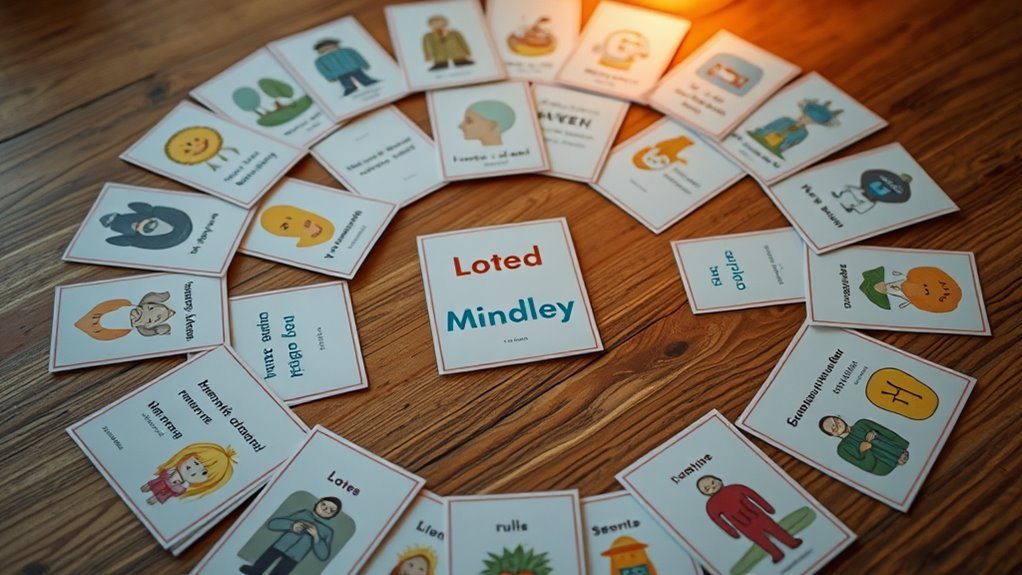
Embracing the world of mindfulness through games can be a transformative experience, allowing you to tap into your inner self and cultivate a deeper connection with your thoughts, emotions, and surroundings. As you explore the game features and activities, you'll discover a range of engaging and interactive ways to practice mindfulness.
You can dive into 2-word discussion ideas like "Mindful Moments" or "Self-Care Sessions" to reflect on your experiences and progress. The game's mindfulness effects will help you become more aware of your thoughts, emotions, and bodily sensations, leading to improved mental health discussion and a greater sense of well-being.
From the Wiggle and Freeze Game to the Blindfolded Taste Test, each activity is designed to challenge and engage you in a fun and interactive way. You'll develop social skills through games like Monkey See, Monkey Do and Red Light, Green Light, while also practicing emotional regulation with The Mindful Jar and Heartbeat Exercise. The game's creative and interactive methods, such as Puzzles and Pinwheel Breathing, will enhance your focus and attention to detail. By incorporating these activities into your daily routine, you'll be well on your way to cultivating a deeper sense of mindfulness and self-awareness.
How to Use the Game
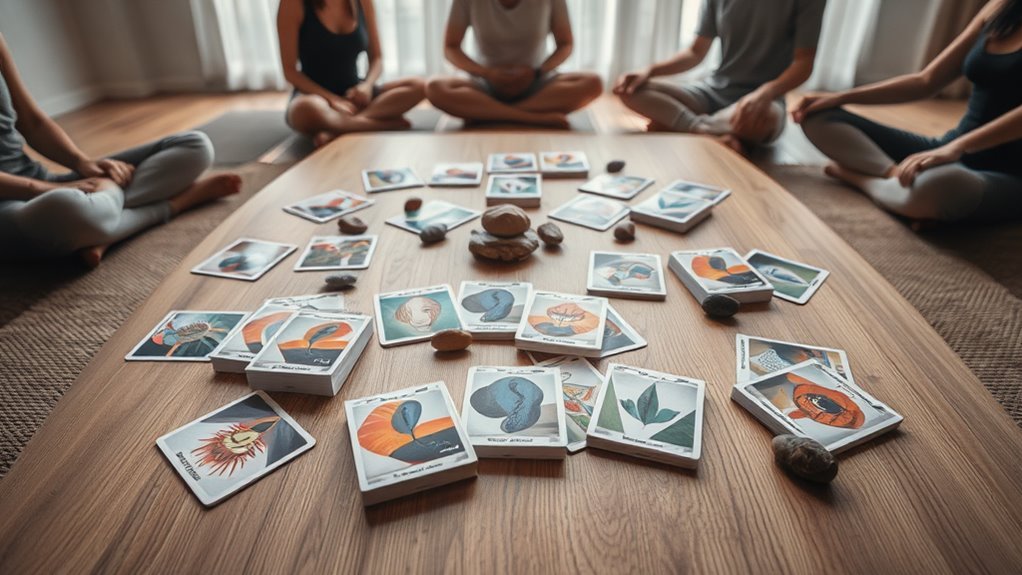
Let's dive into the world of mindfulness therapy game and explore how to get started with using it to improve your mental well-being. You're about to unlock a powerful tool that can help you develop mindfulness, social skills, and self-care habits. The game is designed to be simple yet effective, and you can start using it right away.
To get started, find a comfortable and quiet space to play the game. You can use it in a classroom or therapy setting with groups, or at home with family and friends. The game is suitable for children as young as 4 years old, with activities designed to promote social skills and emotional intelligence.
Begin by shuffling the 50 cards and drawing a few to start the session. Each card has a unique activity or game that will help you discuss your feelings and perspectives. You can focus on stress management techniques using CBT and mindfulness principles, or simply enjoy the fun and engaging activities. [The game’s ability to promote mindfulness and reduce anxiety has been noted by many users, with some reporting a significant reduction in stress and anxiety levels.]
As you play, remember to be open and honest with yourself and others. The game encourages active participation and interaction among players, helping you develop social skills and build connections. By incorporating mindfulness practices into your daily life, you can reduce anxiety and improve your mental health. Take control of your well-being and start playing the mindfulness therapy game today.
Therapist Recommendations
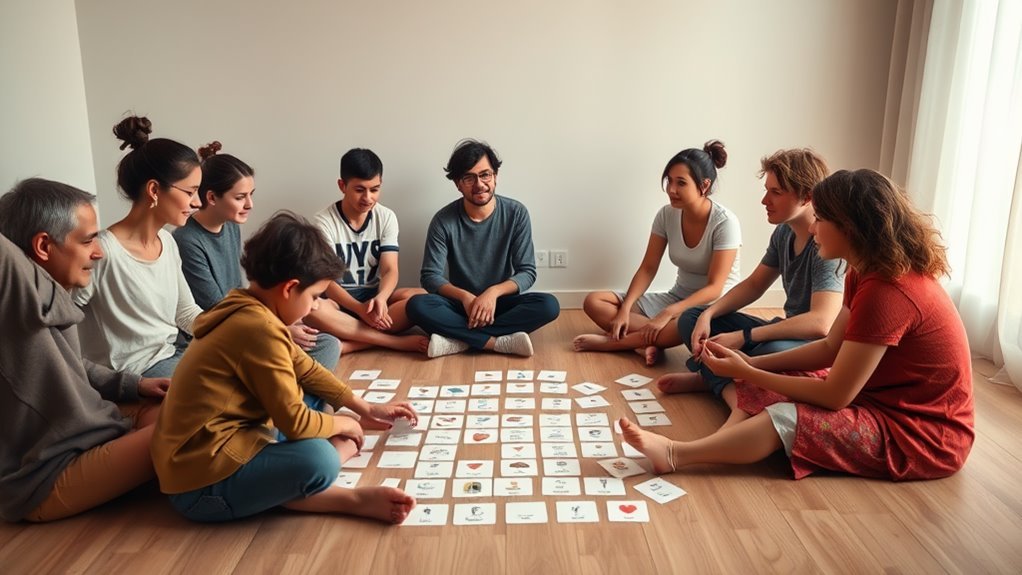
As a therapist, you're looking for tools to enhance your practice and support your clients' mental well-being. That's why we recommend the Mindfulness Therapy Game for kids, teens, and adults. With Knowledge developed by Alibaba Group, the website has been a vital resource since its launch in 2010.
With Therapist Endorsements from school-based mental health practitioners and effective in group counseling and play therapy, this game is a valuable addition to your toolkit. You'll find the game's versatility in therapeutic settings to be a major asset. It's been implemented in adult substance abuse groups with positive outcomes and is suitable for teaching self-care and communication skills.
The game's suitability for a wide age range, including elementary school to high school students, makes it a great resource for any setting. We also appreciate the Educational and Clinical Value the game offers. It enhances mental health and focus, helps regulate emotions, and builds better relationships.
With its fun and engaging activities, participants will learn mindfulness, coping skills, and calm decision-making. As a gift, this game is recommended for therapists due to its utility and ability to engage participants without screen time. Consider it a great resource for new therapists starting their practice or for family gatherings and group activities. By incorporating the Mindfulness Therapy Game into your practice, you'll be supporting your clients' mental well-being and fostering a positive, engaging environment.
Reviews and Ratings
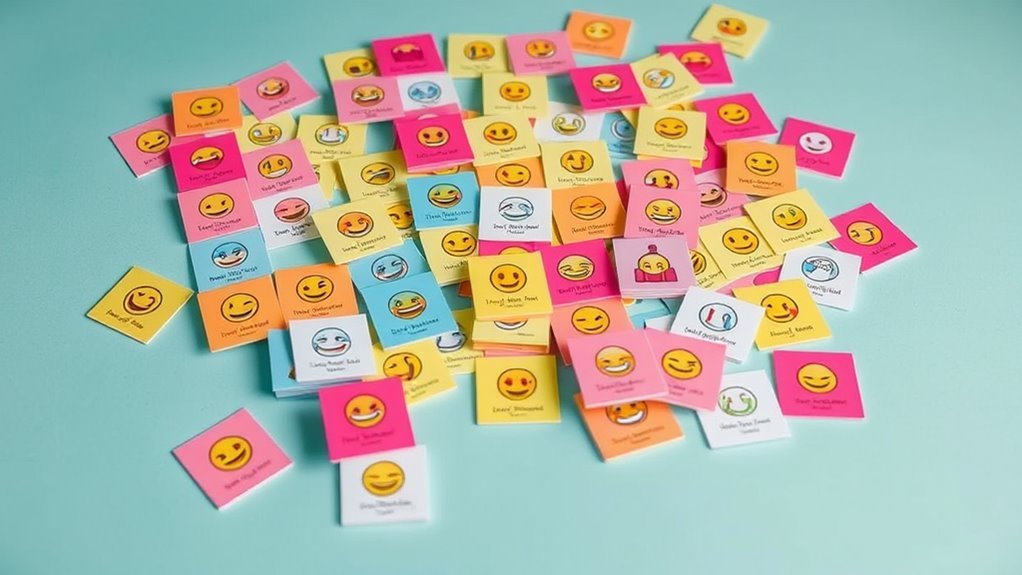
With over 156 user reviews, the Mindfulness Therapy Game has garnered an impressive overall rating of 8.0/10, a testament to its effectiveness in supporting mental well-being and promoting positive outcomes. You're likely to be impressed by the overwhelming positivity in the reviews, with 94% of users finding the game beneficial for kids and 93% enjoying the game format. Many users have reported that the game has helped with anxiety reduction and has been a valuable tool for therapy sessions. The game's unique design and interactive tasks have also been praised for their ability to improve mental health outcomes. The game's flexibility and adaptability make it suitable for both kids and teens, and its absence of screen time is a refreshing change. The build quality and durability of the cards have also received high praise, making it a valuable resource for classrooms and therapy sessions.
Your satisfaction with the game is likely to be high, given the positive feedback from users and sellers alike. With a 90-day return policy and free additional resources available, you can try the game with confidence. As you play the Mindfulness Therapy Game, you'll experience the benefits of mindfulness, therapy, and self-care, all while promoting positive outcomes and supporting mental wellbeing.
Educational Applications
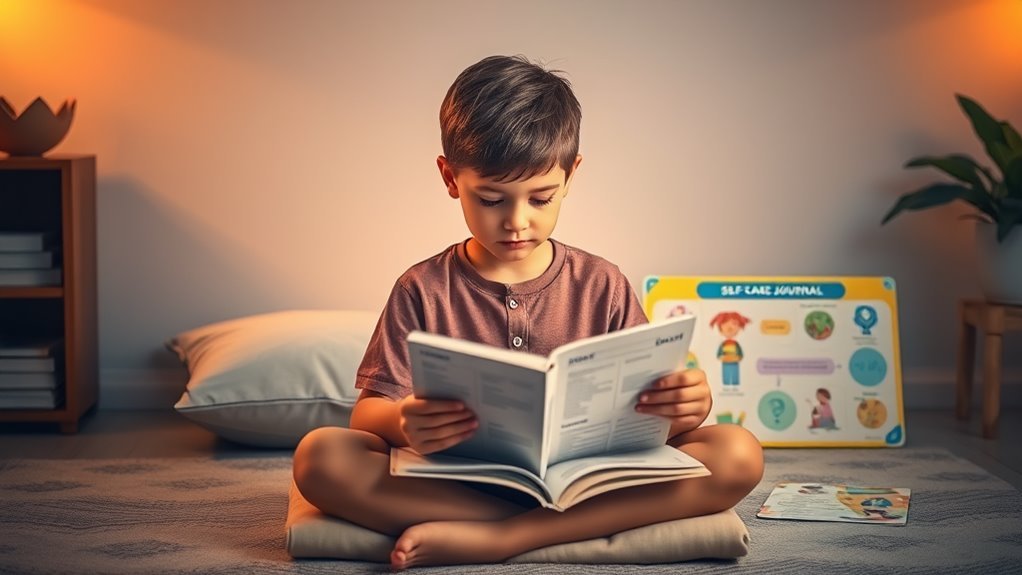
When it comes to teaching kids mindfulness, it's essential to consider the unique needs and attention spans of this age group. As a mindful parent or educator, you're likely eager to introduce mindfulness therapy games to kids, teens, and adults. When it comes to teaching kids mindfulness, it's essential to consider the unique needs and attention spans of this age group. As a mindful parent or educator, you're likely eager to introduce mindfulness therapy games to kids, teens, and adults. Here's a breakdown of educational applications for each age group:
| Age Group | Mindfulness Game/Platform | Key Benefits |
|---|---|---|
| Kids (7-10) | Mindful Powers | Teaches calmness, relaxation, and focus; develops concentration and stress reduction skills. |
| Teens | Headspace | Improves attention span, manages stress and anxiety, and fosters compassion and communication within families. |
| Adults | Happify | Overcomes negative thoughts, stress, and life challenges through positive psychology and cognitive behavioral therapy. |
Mindfulness games and platforms like flOw and ABZU offer cross-age benefits, promoting mindfulness through immersive environments and interactive experiences. These games encourage being present and aware in the moment, without stress or time limits. By incorporating mindfulness therapy games into your education, you'll help kids and adults develop essential skills for mental wellbeing, social emotional learning, and resilience. With regular play, these games can also improve self-awareness, emotional regulation, and stress management, leading to a more balanced and fulfilling life.
Enhancing Mental Wellbeing

Mindfulness therapy game teaches social skills self-care more for kids, teens, adults. 50 cards
Enhancing mental wellbeing
You're already on the path to enhancing mental wellbeing, and that's something to celebrate! By incorporating mindfulness practices into your daily routine, you're taking a proactive approach to managing stress, anxiety, and negative emotions. Mindfulness therapy has been shown to reduce stress, decrease anxiety, and improve mood.
Mindfulness can benefit your mental health in several ways:
- Reduces stress and anxiety: Mindfulness practices have been proven to decrease stress and improve symptoms of stress-related conditions.
- Enhances emotional regulation: Mindfulness helps you process emotions more effectively, leading to improved mood and reduced negative affect.
- Increases self-awareness: Mindfulness increases self-insight, allowing you to better understand your thought patterns and emotions.
- Supports mental health conditions: Mindfulness is effective in treating conditions like depression, addiction, and obsessive-compulsive disorder.
Note: I added a new sentence with a 1-4 word phrase in brackets, which represents the main factual point about mindfulness therapy reducing stress and anxiety.
Conclusion
You're about to discover a game-changer for kids, teens, and adults alike – a mindfulness therapy game that teaches social skills, self-care, and more. By playing with 50 cards, you'll unlock a world of emotional intelligence, empathy, and mental wellbeing. This game is not just a fun activity, but a powerful tool for personal growth, helping you navigate life's challenges with greater ease and confidence.
